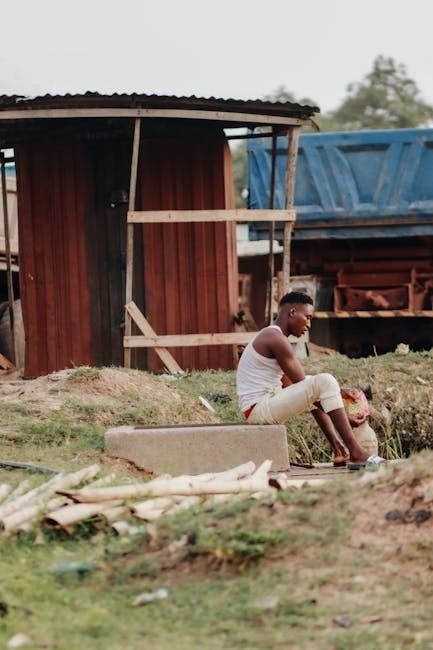Bridges Out of Poverty is a groundbreaking framework by Dr. Ruby K. Payne and co-authors‚ offering insights into poverty’s mental models and hidden rules. It equips professionals and communities with strategies to address poverty sustainably‚ fostering understanding and collaboration across economic classes.
Overview of the Book and Its Importance
Bridges Out of Poverty is a seminal work by Dr. Ruby K. Payne and her co-authors‚ offering a comprehensive framework to understand and address poverty. The book provides insights into the mental models and hidden rules of economic classes‚ enabling professionals and communities to develop effective strategies. It emphasizes the importance of collaboration and sustainable solutions‚ focusing on breaking the poverty cycle through education‚ resource management‚ and systemic change. By addressing the root causes of poverty‚ the book empowers individuals and organizations to create lasting impact. Its practical approach and evidence-based strategies make it an essential resource for anyone working to alleviate poverty and foster economic mobility.
Authors and Their Contributions
Dr. Ruby K. Payne‚ a renowned expert in poverty education‚ is the primary author of Bridges Out of Poverty. Her work challenges myths about poverty and provides actionable strategies. Co-authors Philip E. DeVol and Terie Dreussi Smith bring complementary expertise‚ enhancing the book’s practical applications. Payne’s research on mental models and hidden rules of economic classes laid the foundation for the framework‚ while DeVol and Smith contributed insights into community and institutional approaches. Together‚ they offer a holistic understanding of poverty‚ enabling professionals and communities to implement effective solutions. Their collaborative efforts have made the book a vital resource for addressing poverty sustainably and fostering economic mobility.
Key Concepts of “Bridges Out of Poverty”
Bridges Out of Poverty introduces mental models of economic classes and hidden rules that govern behavior across poverty‚ middle class‚ and wealth. It emphasizes understanding these frameworks to address poverty effectively.
Mental Models of Economic Class
Mental models in Bridges Out of Poverty explain how individuals from different economic backgrounds perceive and interact with their environment. These models highlight the distinct ways people in poverty‚ middle class‚ and wealth approach resources‚ relationships‚ and time. For instance‚ those in poverty often focus on survival and immediate needs‚ while the middle class emphasizes stability and planning. Wealthy individuals‚ however‚ tend to concentrate on accumulating and managing assets; Understanding these mental models helps professionals and communities design interventions that align with the specific needs and perspectives of each group‚ fostering more effective support systems.
Hidden Rules of Poverty‚ Middle Class‚ and Wealth
The concept of hidden rules in Bridges Out of Poverty reveals the unspoken norms governing behavior across economic classes. For those in poverty‚ rules often revolve around survival‚ such as accessing resources quickly and relying on informal networks. Middle-class individuals follow rules like saving money‚ planning for the future‚ and valuing education. Wealthy individuals‚ however‚ focus on investments‚ legacy‚ and maintaining privacy. These hidden rules shape decisions and interactions‚ often invisible to those outside the class. Recognizing these differences helps professionals and communities tailor their approaches to address the unique challenges faced by each group‚ fostering more effective support systems and reducing class-based misunderstandings.
The Poverty Research Continuum
The Poverty Research Continuum in Bridges Out of Poverty outlines a structured approach to understanding and addressing poverty. It begins with identifying the root causes of poverty‚ such as lack of resources‚ education‚ and systemic barriers. Next‚ it involves analyzing the impact of poverty on individuals and communities‚ including mental‚ emotional‚ and societal effects. The continuum then progresses to developing targeted interventions‚ such as education programs‚ job training‚ and policy changes. Finally‚ it emphasizes the importance of long-term sustainability and community empowerment to break the poverty cycle. This comprehensive approach ensures that strategies are evidence-based and tailored to specific needs‚ fostering lasting change and self-sufficiency.
The Causes of Poverty
Bridges Out of Poverty identifies lack of resources‚ education‚ and systemic barriers as primary causes‚ emphasizing the need to address these root issues for sustainable change.
Four Principal Factors of Poverty
The Bridges Out of Poverty framework highlights four primary factors contributing to poverty: lack of financial resources‚ inadequate education‚ limited access to healthcare‚ and systemic discrimination. These interconnected issues create barriers that trap individuals and communities in cycles of economic hardship. Addressing these factors requires comprehensive strategies that promote access to quality education‚ healthcare‚ and financial opportunities. By understanding and targeting these root causes‚ communities can build sustainable solutions to alleviate poverty and empower individuals to achieve long-term stability and prosperity.
Societal and Structural Barriers
Societal and structural barriers play a significant role in perpetuating poverty‚ as outlined in Bridges Out of Poverty. These barriers include discriminatory policies‚ inadequate access to affordable housing‚ and systemic inequalities in education and employment opportunities. Additionally‚ the lack of access to healthcare and social services further entrenches poverty. Structural barriers such as bureaucratic complexities and limited transportation options hinder individuals’ ability to escape poverty. Addressing these systemic issues requires policy reforms and community-driven initiatives that dismantle these obstacles‚ creating pathways for individuals to achieve economic mobility and stability. By tackling these barriers‚ society can help break the cycle of poverty and foster inclusive growth.
Strategies for Addressing Poverty
Bridges Out of Poverty emphasizes multi-level strategies‚ including mental models‚ hidden rules‚ and resource building. It advocates for individual‚ institutional‚ and community approaches to break poverty cycles effectively.
Individual-Level Interventions
Individual-level interventions in Bridges Out of Poverty focus on empowering people through education and skill-building. These interventions aim to enhance financial literacy‚ improve cognitive abilities‚ and provide access to resources like job training. By addressing personal barriers‚ such as lack of education or unstable environments‚ individuals can gain the tools needed to escape poverty. The framework emphasizes the importance of mental models and understanding the hidden rules of economic classes to help individuals navigate systems effectively. These strategies are designed to stabilize lives‚ build resilience‚ and create pathways for sustainable self-sufficiency. They are often combined with community and institutional support for maximum impact.
Institutional and Community-Level Approaches
Institutional and community-level approaches in Bridges Out of Poverty focus on creating systemic change to address poverty. These strategies involve collaboration between organizations‚ schools‚ and local governments to provide resources and support. By addressing structural barriers‚ such as lack of access to healthcare or education‚ communities can create environments that foster stability and growth. Initiatives like job training programs‚ affordable housing‚ and financial assistance are key components. These approaches aim to build collective capacity‚ ensuring that resources are accessible and effective. The goal is to create long-term‚ sustainable change by empowering communities to take ownership of poverty reduction efforts.
Policy Implications for Poverty Reduction
Bridges Out of Poverty emphasizes the importance of policy changes to address systemic barriers. Policymakers must prioritize education‚ job training‚ and economic opportunities to reduce poverty. Tax reforms‚ affordable healthcare‚ and social safety nets are critical. By investing in infrastructure and resources for low-income areas‚ policies can create pathways for upward mobility. Collaboration between governments‚ organizations‚ and communities ensures sustainable solutions. The framework advocates for evidence-based policies that address the root causes of poverty‚ fostering long-term economic stability and social equity.
Language‚ Cognition‚ and Poverty
Language and cognition significantly impact poverty. Dr. Ruby K. Payne’s framework highlights how differences in language register and cognitive patterns can impede opportunities for individuals in poverty‚ perpetuating cycles of disadvantage.
Role of Language in Economic Class
Language plays a pivotal role in economic class‚ as highlighted in Bridges Out of Poverty. Dr. Ruby K. Payne emphasizes that individuals in poverty often use an informal language register‚ while middle-class and wealthier individuals use formal register. This difference can create barriers in education‚ job opportunities‚ and professional advancement. The framework suggests that understanding these linguistic differences is crucial for breaking the poverty cycle. By addressing communication gaps‚ professionals and communities can better support individuals in navigating economic mobility. Language‚ therefore‚ is not just a tool for expression but a critical factor in accessing resources and opportunities. Recognizing these dynamics is essential for fostering equitable systems.
Cognitive Differences and Their Impact
Cognitive differences play a significant role in understanding poverty‚ as explored in Bridges Out of Poverty. Dr. Ruby K. Payne highlights that individuals in poverty often develop unique cognitive patterns due to their environment. These patterns‚ shaped by necessity‚ focus on immediate problem-solving and survival. While this adaptability is crucial for navigating poverty‚ it can create challenges in settings that require long-term planning or abstract thinking. Chronic stress and resource scarcity can also impair memory‚ attention‚ and decision-making. Recognizing these cognitive differences is essential for designing interventions that address the root causes of poverty and support individuals in breaking the cycle. This understanding fosters more effective strategies for education‚ employment‚ and community development.

Family Structure and Resources
Family structure significantly impacts poverty dynamics. Generational poverty often leads to limited resources and unstable environments. Understanding these challenges is key to developing effective support systems.
Impact of Family Dynamics on Poverty
Family dynamics play a crucial role in perpetuating or breaking the cycle of poverty. Generational poverty often results from unstable family environments‚ limited resources‚ and insufficient support systems. Dr. Ruby K. Payne’s work highlights how family structures influence economic stability‚ with fragmented families facing greater challenges in resource management. The absence of role models and mentorship further exacerbates these issues. Understanding these dynamics is essential for developing interventions that address the root causes of poverty‚ fostering resilience‚ and creating pathways for upward mobility. By strengthening family support systems‚ communities can help individuals escape poverty and build sustainable futures.
Resource Management in Poverty
Resource management is a critical challenge for individuals in poverty‚ who often face limited access to financial‚ educational‚ and social resources. Dr. Ruby K. Payne’s framework emphasizes that those in poverty must constantly navigate trade-offs‚ prioritizing immediate needs over long-term investments. This can lead to cycles of debt and instability. Effective resource management requires not only financial literacy but also access to supportive networks and systems. Programs that provide training in budgeting‚ savings‚ and asset-building are essential to help individuals break free from poverty. By addressing these systemic barriers‚ communities can empower individuals to manage resources more effectively and achieve economic stability.

Education and Poverty
Education is a vital tool for breaking the poverty cycle‚ providing individuals with the skills and knowledge needed for economic mobility and sustainable livelihoods.
Role of Education in Breaking the Poverty Cycle
Education plays a pivotal role in breaking the poverty cycle by equipping individuals with essential skills‚ knowledge‚ and opportunities. Through formal schooling and vocational training‚ people gain access to better-paying jobs‚ improving their socio-economic status.
Challenges in Educational Access
Access to quality education is a significant challenge for individuals in poverty‚ as highlighted in Bridges Out of Poverty. Financial constraints‚ lack of resources‚ and systemic inequalities often limit opportunities for marginalized groups. Many face barriers such as inadequate access to technology‚ transportation‚ and extracurricular support‚ exacerbating the gap in educational attainment. Additionally‚ schools in impoverished areas frequently struggle with underfunding and teacher shortages‚ further hindering academic progress. These challenges perpetuate cycles of poverty by denying individuals the skills and knowledge needed to secure better-paying jobs and improve their socio-economic status. Addressing these systemic issues is crucial for breaking the poverty cycle.
Community Development and Poverty
Bridges Out of Poverty emphasizes community development as a vital strategy for reducing poverty. It advocates for collaborative efforts between local organizations‚ businesses‚ and governments to create sustainable growth and collective action.
Building Sustainable Communities
Bridges Out of Poverty highlights the importance of sustainable community development to reduce poverty. It emphasizes the need for long-term support systems‚ resource management‚ and collective action. Communities are empowered through education‚ job creation‚ and access to essential services‚ fostering economic stability. The framework suggests that sustainable communities are built by addressing the root causes of poverty and creating opportunities for individuals to thrive. By engaging local organizations‚ businesses‚ and governments‚ Bridges Out of Poverty provides a comprehensive approach to breaking the poverty cycle and ensuring lasting prosperity.
Community Engagement Strategies
Bridges Out of Poverty emphasizes the role of active community engagement in reducing poverty. It advocates for inclusive participation‚ where individuals from all economic backgrounds collaborate to identify needs and solutions. Strategies include workshops‚ mentorship programs‚ and resource sharing to build trust and empower residents. By fostering partnerships between local organizations‚ businesses‚ and government‚ communities can create environments that support economic mobility. The framework also highlights the importance of cultural sensitivity and understanding in designing effective engagement strategies. These approaches ensure that initiatives are tailored to the unique needs of each community‚ promoting lasting change and collective prosperity.

Case Studies and Success Stories
Bridges Out of Poverty highlights real-world applications of its framework‚ showcasing communities and individuals who successfully transitioned out of poverty through strategic interventions and support systems.
Examples of Effective Poverty Intervention
Bridges Out of Poverty provides compelling case studies of communities and organizations that successfully implemented its strategies. For instance‚ the West Ohio Community Action Partnership utilized the framework to create sustainable programs‚ leading to significant reductions in poverty rates. Similarly‚ schools and businesses have adopted these strategies‚ fostering environments where individuals can acquire the necessary skills and resources to escape poverty. These success stories demonstrate the framework’s effectiveness in addressing systemic barriers and empowering individuals to achieve long-term stability. By focusing on collaboration and resource management‚ these interventions have created lasting impact and serve as models for others.
Lessons Learned from Real-World Applications
The implementation of Bridges Out of Poverty has revealed key lessons‚ emphasizing the importance of understanding the hidden rules of economic classes. Real-world applications show that sustainable change requires addressing systemic barriers and fostering collaborations between individuals‚ institutions‚ and communities. The framework’s effectiveness is evident in its ability to empower individuals by providing them with the tools to navigate different economic environments; However‚ challenges such as resistance to change and resource limitations highlight the need for tailored approaches. These insights underscore the necessity of combining education‚ policy reform‚ and community engagement to achieve long-term poverty reduction‚ as demonstrated in various case studies and success stories.
Criticism and Controversies
Bridges Out of Poverty has faced criticism for its perceived oversimplification of poverty’s complexities and lack of empirical evidence supporting its framework. Some argue it places undue emphasis on individual responsibility over systemic issues‚ potentially overlooking structural barriers and societal inequities.
Debates on the Effectiveness of the Model
Bridges Out of Poverty has sparked debates regarding its effectiveness. Supporters argue it provides practical tools for understanding poverty and fostering collaboration across economic classes. Critics‚ however‚ highlight concerns about its reliance on anecdotal evidence and lack of rigorous scientific validation. Some question whether the framework adequately addresses systemic issues‚ focusing instead on individual responsibility. Despite these criticisms‚ the model remains widely used in education and community development‚ with many professionals finding its strategies helpful in their work with impoverished populations. The debate continues‚ with some calling for more comprehensive‚ evidence-based approaches to poverty reduction.
Criticisms of the Framework
Bridges Out of Poverty has faced criticism for its approach to addressing poverty. Some argue that the framework oversimplifies complex issues‚ focusing too much on individual actions while neglecting structural and systemic barriers. Critics also point out that the model lacks a robust evidence base‚ with many of its concepts developed from practice wisdom rather than rigorous research. Additionally‚ there are concerns that the framework may perpetuate stereotypes about people in poverty‚ emphasizing deficits rather than strengths. Despite these criticisms‚ the model remains popular in certain circles‚ though its limitations have led some to call for more nuanced and comprehensive approaches to poverty reduction.
Implementation and Training
Bridges Out of Poverty emphasizes practical strategies for professionals and communities. Training programs focus on building skills‚ fostering collaborations‚ and creating sustainable solutions to address poverty effectively.
Training Programs for Professionals
Training programs based on Bridges Out of Poverty are designed to equip professionals with actionable strategies. These programs focus on understanding the mental models and hidden rules of poverty‚ enabling service providers to better assist individuals in need. By addressing the root causes of poverty‚ such as resource management and cognitive differences‚ these trainings foster empathy and effective intervention. Professionals learn to create supportive environments that stabilize lives and build resources‚ ultimately helping individuals transition out of poverty. The programs emphasize sustainable solutions and collaborative efforts‚ ensuring long-term impact in communities and organizations.
Community Workshops and Initiatives
Community workshops inspired by Bridges Out of Poverty aim to empower individuals and groups through education and collaboration. These initiatives often include interactive sessions where participants explore the hidden rules of poverty‚ mental models‚ and strategies for breaking the poverty cycle. Workshops focus on building sustainable communities by addressing systemic barriers and fostering resource management. They encourage active engagement‚ providing tools for individuals to stabilize their environments and access opportunities. By fostering partnerships among community members‚ organizations‚ and leaders‚ these initiatives create a collective impact‚ ensuring that efforts to alleviate poverty are both comprehensive and long-lasting. They emphasize the importance of shared responsibility in creating pathways out of poverty.

Legacy of Ruby K. Payne
Dr. Ruby K. Payne is renowned for her groundbreaking work in understanding poverty‚ particularly through her book Bridges Out of Poverty. Her research and frameworks have significantly influenced social and educational policies‚ empowering communities and professionals to address poverty effectively.
Her Contribution to Understanding Poverty
Dr. Ruby K. Payne has revolutionized the understanding of poverty through her seminal work‚ Bridges Out of Poverty. Her research identifies mental models and hidden rules across economic classes‚ providing a framework for professionals and communities to address poverty effectively. Payne’s insights emphasize the importance of language‚ cognition‚ and family dynamics in perpetuating or escaping poverty. Her work bridges gaps between theory and practice‚ offering practical strategies for sustainable change. By focusing on individual and systemic factors‚ she has empowered countless organizations to implement solutions that foster long-term prosperity and equity.
Influence on Social and Educational Policies
Dr. Ruby K. Payne’s work has significantly shaped social and educational policies‚ influencing how institutions approach poverty alleviation. Her framework‚ detailed in Bridges Out of Poverty‚ has informed policy changes by emphasizing the need for systemic support and resource management. Educational programs now incorporate her insights on cognitive differences and language barriers‚ creating more inclusive environments. Payne’s strategies have been integrated into community development initiatives‚ fostering sustainable solutions. By addressing the root causes of poverty‚ her work has inspired policies that promote equity and long-term prosperity‚ impacting both individual and societal levels effectively.
